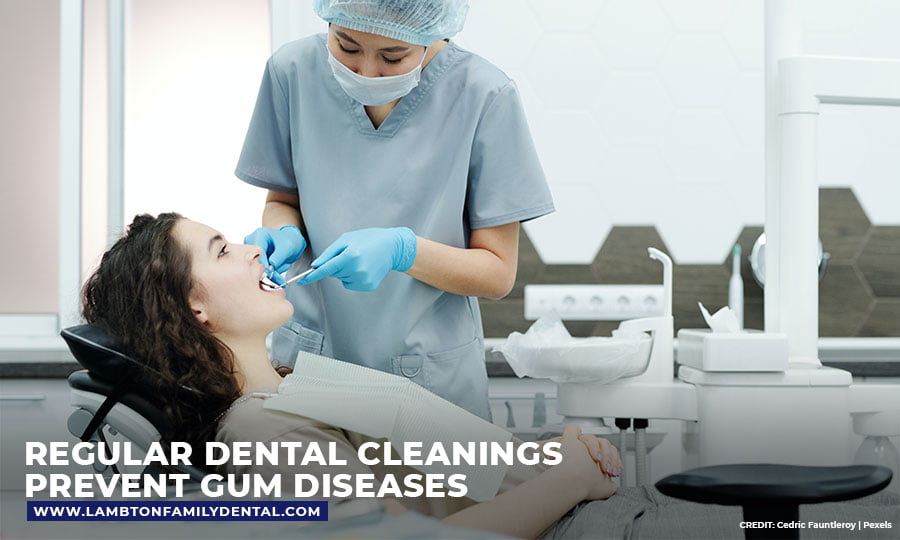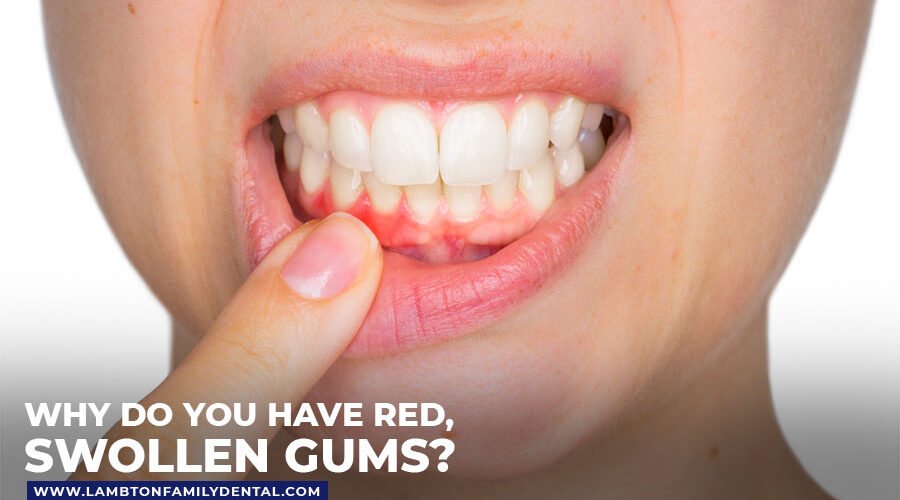When it comes to dental health, most people are more likely to focus on taking care of their teeth. However, it is equally essential to pay close attention to the gums. Gums have a significant role both in your dental health and your overall well-being.
Your gums are full of blood vessels that transport oxygen and nutrients to the roots of your teeth. It’s therefore vital to pay attention to the state of your gums to ensure good oral health.
Swelling anywhere in the body, including your gums, usually signals that something is wrong and needs immediate attention. Catching the early signs of swollen gums and providing treatment as soon as possible is the best way to prevent it from turning into more serious forms of gum disease, such as gingivitis and periodontitis.
Common Causes of Red, Sore Gums

Red, bleeding, and swollen gums around your teeth are common dental concerns. Knowing what caused the problem will better equip you to deal so you can keep your teeth and gums in good shape.
- Gingivitis
Among the most common causes of swollen gums is gingivitis, a condition that causes your gums to become swollen and irritated. Unfortunately, many people are not aware they have gingivitis as symptoms are typically low-key. However, when left untreated, it can eventually result in a more serious dental disease known as periodontitis, which puts you at risk of premature tooth loss.
Gingivitis is a common problem in people with poor oral hygiene. When you failed to brush and floss your teeth regularly, plaque can build up on your teeth and gum line. Plaque is a thin, transparent film of bacteria and food particles deposited on the teeth over time. If plaque continues to remain on their teeth for several days, it turns into tartar.
Tartar, also known as calculus, is a hardened plaque, which cannot be removed with brushing and flossing alone. Tartar buildup can only be eliminated with professional teeth cleaning. When left unresolved, it can lead to gingivitis. Make sure to visit your dentist to receive immediate gingivitis treatment.
- Periodontitis
If left untreated, tartar can expand to deep under the gum line and create pockets filled with food particles and harmful bacteria. Over time, it causes gum tissue irritation, which results in a serious dental condition known as periodontitis. Untreated periodontitis can lead to gum recession, infection, bone loss, and even premature tooth loss.
- Infection
Fungi and viruses can cause an infection that potentially leads to the swelling of the gums. A person suffering from herpes is at risk of acute herpetic gingivostomatitis, a condition that causes swollen gums.
Thrush, a dental condition caused by the overgrowth of naturally occurring yeast in the mouth, can also cause gum inflammation. Furthermore, serious tooth decay can also lead to an abscess, which is a localized gum swelling.
- Malnutrition
Deficiency in vitamins, particularly B and C, is a factor that triggers gum swelling. Vitamin B helps keep irritation on the inside and outside of your mouth at bay, reducing the risk of inflammation. Vitamin C, on the other hand, maintains the health of the connective tissues in your gums. A drastic drop in the level of vitamin C in your body increases your risk of developing scurvy. Untreated scurvy can result in anemia and periodontal disease.
- Pregnancy
Women may experience swollen gums during pregnancy. The imbalance of hormones during pregnancy causes the blood flow in your gums to increase. Increased blood flow triggers gum irritation, which ultimately leads to swelling.
Furthermore, hormonal changes can lower the ability of your body to combat harmful bacteria and viruses that can give rise to the development of various dental problems, increasing your risk of gingivitis and other periodontal diseases.
- Aggressive Brushing and Flossing
Brushing and flossing are crucial for keeping your mouth, teeth, and gums healthy. However, brushing your teeth too hard can do more harm than good. Using a hard-bristled toothbrush can erode your tooth enamel and irritate your gums.
Instead, choose a soft-bristled toothbrush and gently brush your teeth as show by your dental professionals. When flossing your teeth, be sure to gently and carefully move the floss between your teeth. Also, use toothpaste and mouthwash that are highly recommended by dental professionals.
Home Treatments for Swollen Gums
If you notice that your gums are red and swollen, these home treatments can help minimize the symptoms:
- Brushing and flossing gently helps soothe swollen gums.
- Use saltwater solutions to rinse your mouth and kill harmful bacteria.
- Hydrate yourself by drinking at least 8 glasses of water a day. Drinking water helps stimulate saliva production, which helps neutralize acid and combat disease-causing bacteria in the mouth.
- Avoid strong mouthwashes, alcoholic beverages, and tobacco.
- Apply a warm compress over the face (on the affected area) to help minimize pain. On the other hand, a cold compress helps reduce swelling.
While these treatments can reduce symptoms, they do not prevent the underlying problem. It’s best to book an appointment with your dentist in Sarnia as soon as possible.
Dental Treatments for Swollen Gums

If the swollen gums last for more than 2 weeks, visit a trusted Sarnia dentist for a checkup and treatment. You will be asked a series of questions like when the symptoms started, how often they occur, a possible pregnancy, or recent changes in your diet. The dentist may also recommend a full mouth dental X-ray and blood test to check the possibility of an infection.
Depending on what caused the swelling of your gums, the dentist may prescribe an alcohol-free mouthwash to reduce plaque buildup and prevent the risk of gingivitis. They may also recommend using a specific toothpaste brand. In case of gum infection, antibiotics may be necessary to treat the problem.
If you are suffering from serious gingivitis, your dentist or hygienist may need to perform more invasive treatments. One of the most common treatments for extreme cases of gingivitis is root planing. This allows the dentist or hygienist to scrape away the diseased gums and tartar on the roots of the teeth to prevent gingivitis from spreading and enable the remaining gum tissues to heal.
If you have persistently swollen gums that don’t seem to get any better, visit Lambton Family Dental. We provide comprehensive dental care to all Sarnia residents. We have a full range of dental services and treatments to safeguard your dental health. Schedule an appointment with us at 519-344-5747, or fill out our contact form to send us a message.

